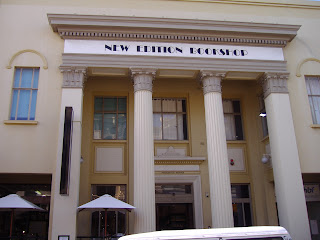Initially The Magus seems intimidating, boasting 650 pages of dense type. Then there is its reputation as one of the great cult books; described as being a cascade of literary, philosophical and psychological pretensions in Gina McKinnon’s 500 Essential Cult Books (2010). Whilst such descriptions are relevant, the novel offers far more than these perfunctory summations, being one of those genuine masterpieces that can both challenge and enthrall the reader. Fowles spent over ten years writing the book and also ended up rewriting sections for a new edition released in 1977. The Magus is a complex novel and will take you on an enthralling journey if you are prepared to invest both time and patience.
Set in post WWII Britain, the novel’s protagonist – Nicholas Urfe, is both inhibited by his upbringing and restless within his own middle class society. The novel is divided into three sections, with the first being concerned with Nicholas’ life in the shadow of his parents and the stifling conformity of early 1950’s Britain and also his early days in Greece. This initial section is by no means a dull prologue, with Fowles revealing an unpretentious narrative style that displays a clear and sparse beauty, particularly in the later sections set in Greece.
In frustration Nicholas applies for and gains employment at an exclusive private school on a remote Greek island known as Phraxos (based on the island of Spetsai, where Fowles taught English at the Anargyrios College in the 1950’s). Before he is able to leave he becomes involved with an Australian woman called Alison. He spurns her love and arrives in Greece in a conflicted state of mind. His lonely exploration of the small island soon brings him into contact with Maurice Conchis, the eponymous ‘Magus’ figure of the book. Having heard about this mysterious character during a brief meeting with his predecessor Nicholas can’t help but be curious.
“Are you elect?” This is the question that Maurice Conchis asks Nicholas just before Conchis starts to take him, and the reader, down some vary strange paths. I looked up the meaning of this word and I believe that Fowles uses this term as a noun, meaning either a person worthy to be chosen, or the theological meaning: when a person or persons are chosen by God, especially for favor or salvation. After finishing this remarkable novel I believe that this is a question that is also aimed at the reader.
The long middle section can only be described as a total head-trip. I cannot think of a more apt term to describe the shifting realities of Nicholas’s interaction with Conchis and the philosophical and metaphysical concepts that challenge Nicholas’s conception of his own place in the cosmos. This section is supremely suspenseful and I totally surrendered to Fowles’ tricks as he drove the narrative forward with increasingly mysterious and extreme events. I found myself thinking about the book constantly and was driven to read it to discover just what was going to happen next, making this novel perhaps the most enjoyable I’ve read for quite some time. The Magus is also perhaps the most intense book I’ve ever read. I advise you to read this book when you have plenty of time to think about its themes and also to have time to recover from the tension it creates. I suggest some fine red wine to facilitate both!
Fowles has been described as one of the first British post-modern writers. I can’t personally judge the validity of this claim, however the novel does invite the reader to make their own judgments about the meaning of Nicholas’s experiences at the hands of the duplicitous Conchis and his never-ending ‘masque’. Fowles has famously refused to explain the meaning of The Magus, except on one rare occasion, of which I suggest you read after you’ve tackled the novel and thought about it yourself. I came to three conclusions about the meaning of what Fowles was portraying during the course of the novel, two of which correspond roughly with his summation and a third that did not. I’m not going to talk about what I believe the novel is about because each new reader will need to come to his or her own conclusions. Let me know what you thought or contact me if you want to know what I thought.
The third and final section of the novel finds Nicholas back in England a changed man in search of answers. This section’s bleak tone and slow pacing is in stark contrast to the intense middle section, but works well as a necessary coda to the events of the rest of the book. The ending is famous for being inconclusive and baffling, however after thinking about it for some time I realized that it is totally apt and fits well with my own conclusions about the book; in fact it serves to push you in the right direction if your eyes are open. The Magus is a work of genius and for the first time in this blog’s short history I am giving it a sublime rating.










